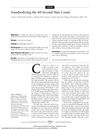A Novel Hair Restoration Technology Counteracts Androgenic Hair Loss and Promotes Hair Growth in a Blinded Clinical Trial
January 2023
in “
Journal of Clinical Medicine
”

TLDR A new hair restoration technology was found to effectively increase hair thickness, density, and growth, while reducing hair loss and improving scalp health, with no side effects.
A blinded clinical trial involving 20 subjects (4 female, 16 male) over 9 months demonstrated the effectiveness of Tomorrowlabs HIF strengthening factor [HSF] hair restoration technology in treating androgenic alopecia (AGA). The daily application of [HSF] resulted in improvements in hair thickness (+7.2%), hair density (+14.3%), and shine and elasticity (+20.3%). Hair loss was reduced by an average of 66.8% in responsive subjects after 6 months, and hair growth increased up to 32.5%, with an average change of 8.4% in all participants and 10.8% in responsive patients after 9 months. The hair growth cycle was also harmonized, with an average increase of +8.0% in anagen (growth phase) hair and a reduction of -14.0% in telogen (resting phase) hair. The product was found to be safe, beneficial for scalp health, and free of side effects.

















